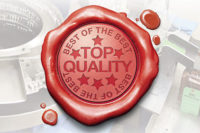Management
Tight Tolerances at Top Tool


Top Tool manufactures parts so small that thousands could fit in the tiny vial shown above. Source: Top Tool

At the inset, the stamping process helps minimize variation. Source: Top Tool

The company has devoted itself to employee training, advanced manufacturing practices, investments in high-precision technology, and a commitment to certifications and quality. Source: Top Tool






Collaboration with customers, aggressive miniaturization, and advanced part qualification have earned this micro stamping component supplier the title of 2013 Quality Plant of Year.
I can’t tell you how exciting Top Tool Co. is, but I can give you an idea.
Top Tool, based in Minneapolis, manufactures a range of precision metal stamping components for industries known for their demand for tight tolerances: medical, defense, electronics and energy. Unfortunately, however, much of its work is so innovative that the company can’t talk about it. Since it supplies components for OEMs, often it isn’t able to discuss its products until they reach the market. And with so many cutting-edge products not quite at the market yet, the company can’t share much about them because the industrial secrets are protected by nondisclosure agreements. But what can be shared is still impressive.
The company has devoted itself to employee training, advanced manufacturing practices, investments in high-precision technology, and a commitment to certifications and quality. For these reasons and others, our judges unanimously voted Top Tool our 2013 Plant of the Year.
Quality Meets Top Tool
Driving from the Minneapolis Airport to Top Tool doesn’t take long. As well as being near the Mall of America, the company is located in “Medical Alley,” a concentration of medical device companies. In fact, the sales manager passes four Medtronic offices on his 16-mile drive home.
Though the Top Tool building—located in the corner of an office park—doesn’t stand out, the company does. It supplies components for implantable medical devices, surgical instruments and electronics to some of the biggest players in industry.
And the people inside the building deserve credit for this, including owners not afraid to take risks and a dedicated staff that sticks around. (Most of the management team has been at Top Tool for more than five years, although President Mark Erickson joined the company in 2012
Top Tool’s work involves a range of products and industries, many requiring tight tolerances and micron-level accuracy. Though you likely would not be familiar with the company—although it has been recognized with several awards and been visited by politicians from both parties—you probably have heard of its customers: St. Jude Medical, for example, or 3M, makers of Scotch tape. Today the company makes a range of components, including some so miniscule that 5,000 of them could fill half a prescription bottle. They look like flakes or crumbs to be discarded from a larger product, but they are the product. These tiny parts made at Top Tool will go on to fit inside items from a paper cutter to a pacemaker.
And the high-technology products require high-tech equipment. The company recently purchased a wire electrical discharge machining (EDM) machine. And high-tech isn’t a small expense. But, by investing in this equipment, the company hopes to expand and compete in this area. Because of the company’s experience and technology, the world’s largest medical companies rely on this small 30-person shop.
|
Corporate Goals
|
How to Succeed in Business
Though Top Tool was founded in 1966, owners Al and Elizabeth Abraham bought the business 25 years ago. Under their leadership, the business changed from primarily a tool and die shop to one that specializes in stamping precision micro components. Though this was a risky decision, it paid off. And, luckily, the stamping process itself is stable. As Sales Manager Duane Kari explains, “Stamping mitigates risk. It’s an inherently fixed outcome. It’s how coins are made, whereas with handmade products, it’s hard to say that it’s the same. The stamping die minimizes variation.”
And a set of processes helps minimize variation as well. In addition to a rigorous quality program, the company teaches employees that they are all part of the quality department. Quality Assurance Manager Joe Lendway says that it’s not his quality manual, it’s everyone’s. And this attitude toward quality runs through the business.
“It’s a company where it’s easy to come to work every day because everybody’s got the same desire to move forward,” says Lendway.
“It’s satisfying to make quality parts that are impacting and changing people’s lives,” adds Kari. “Without quality, you’re sunk. With better quality, the rest is secondary. What good is it if it doesn’t work?”
In order to achieve high quality, the company also uses Six Sigma and Lean Continuous Process Improvement (CPI). Processes are important in order to comply with FDA regulation as well as the U.S. International Traffic in Arms Regulations (ITAR) national security directive. And since the company works with precious metals, minimizing waste is also important.
While some requirements might scare other competitors away, Top Tool steps in. And it does a great job at it. Warranty costs are only 0.4% of sales. Rework is 0.9% of sales. The company attributes these numbers to its mission of getting quality as close as possible to the production process.
It’s a fast-moving process, too. Before showing me the stamping press, employees hand out earplugs. The machines sound like a metronome as they stamp 504 parts every minute. The parts will be made by the millions.
Duane Kari and Joe Lendway continue the tour with a visit to Duane’s older brother. Dave Kari is the company’s most senior employee, with 25 years at the company this year. In addition to his experience, it was his leadership that led to the company to purchase a new wire EDM machine that can work with wire one-fourth the thickness of human hair.
As we tour the EDM room, Duane points out parts that are 10 times smaller than they used to be. He displays a range of clamps, each smaller than the next. This march of progress has benefitted some of the world’s largest medical device companies, he says. “The technology that has come out of this room helped those companies get better.”
In the quality department office, a quote from Deming is on a computer screen: “If you can’t describe what you are doing as a process, you don’t know what you are doing.”
And Top Tool follows this approach with validated, ironclad processes. “That’s why we’re doing nuclear and medical,” Duane says. “We do take it to the nth degree.”
Working Together
Customers appreciate this approach. Mark Dorman is an engineer with Ultra Electronics, a nuclear sensors and process instrumentation company in Round Rock, Texas. As you might expect, this industry requires a lot of documentation. In order to work with Ultra Electronics, Top Tool needs to submit additional paperwork, go through regular audits, and host customer visits. Staff from both companies have been to the other’s locations. And with Top Tool being a small company, it means that Dorman will just have one engineering contact and one sales contact.
Dorman said he can call project engineer Ted Huot anytime to discuss Ultra’s parts. “He knows a lot about our parts,” Dorman says. “Maybe this doesn’t sound like much, but at a big company that is not always the case.”
Considering that Top Tool makes about 100 parts for Ultra Electronics, this is also noteworthy. The parts are often made in small lot sizes, which helps with just-in-time inventory.
In the five years that Dorman has been working with Top Tool, he could recall only one issue: “We received a shipment of parts that were missing a material certification. They sent it within hours.”
The Future
Successful companies don’t just rest on their past work, and Top Tool continues to evolve and change. The company is now looking into expanding their exports—and not just because Duane Kari had received his passport the day before my visit. “It’s the next biggest thing,” Kari says. “We feel other parts of the world can use our quality.”
Top Tool At a Glance
|
Looking for a reprint of this article?
From high-res PDFs to custom plaques, order your copy today!











